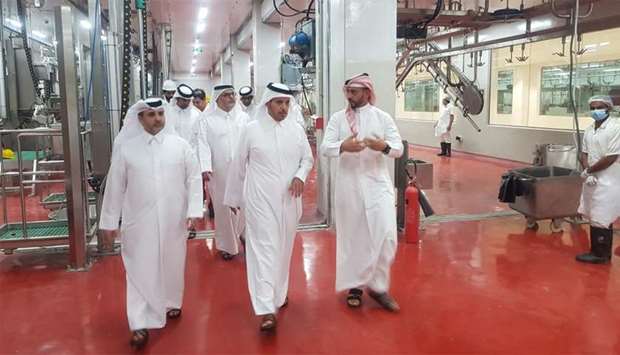*PM visits site and reviews progress of the project
HE the Prime Minister and Minister of Interior Sheikh Abdullah bin Nasser bin Khalifa al -Thani visited the upcoming Central Market at Al-Wakra and reviewed the progress of the project which is scheduled to open before the end of this year.
Under the supervision of the Ministry of Municipality and Environment, Hassad Food company funded the development of the new central markets including Al-Wakra Market, that will be the central livestock market including a state-of-the-art automated slaughterhouse, the most advanced in the Middle East region. Aswaq, a subsidiary of Hassad, will manage all the three central markets.
Mohamed al-Sadah, Hassad Food CEO, commented: “By funding the development of the new central markets and managing it through Aswaq we aim to support the national products and fulfill the needs of the producer, trader and consumer to achieve self-sufficiency."
Al-Wakra market is based on the latest international systems, to serve the needs of all categories: producer, trader and consumer. The market is spread over approximately 230,000sq m and is located at the junction of the modern and major road network. It is just 30 minutes away from the heart of Doha and close to the Hamad Port, which is used to import livestock and fodder.
The market is divided into several sections to serve the livestock trade: barns, automated slaughterhouse, shops, hypermarkets, service shops and administrative offices. The barns section comprises of more than 600 shaded storage and display sheds in line with international specifications and sizes. The fodder storage area is more than 5200 square meters.
Also the market includes the new central automated slaughterhouse, which covers an area of approximately 14,000 square meters, with a production capacity of 9,000 heads per day for sheep using modern techniques to maintain the quality of products and efficiency of operations, in addition to another line for cows and camels.
All retail, wholesale and hypermarket sections are air-conditioned. The market includes 102 shops to support the main activity such as fodder, grain, veterinary and supplies. .
Additionally, the retail section includes 76 shops that sell vegetables and fruits, dried fruits, honey, and dates as well as the traditional market. Six service shops are allocated for cafeteria, supermarket and restaurants.

